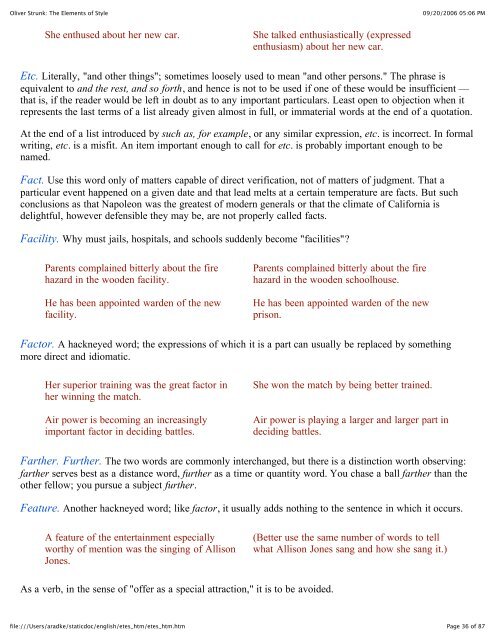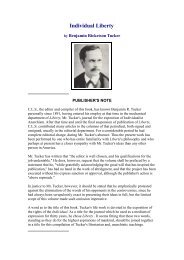Oliver Strunk: The Elements of Style - Evernote
Oliver Strunk: The Elements of Style - Evernote
Oliver Strunk: The Elements of Style - Evernote
You also want an ePaper? Increase the reach of your titles
YUMPU automatically turns print PDFs into web optimized ePapers that Google loves.
<strong>Oliver</strong> <strong>Strunk</strong>: <strong>The</strong> <strong>Elements</strong> <strong>of</strong> <strong>Style</strong><br />
She enthused about her new car. She talked enthusiastically (expressed<br />
enthusiasm) about her new car.<br />
file:///Users/aradke/staticdoc/english/etes_htm/etes_htm.htm<br />
09/20/2006 05:06 PM<br />
Etc. Literally, "and other things"; sometimes loosely used to mean "and other persons." <strong>The</strong> phrase is<br />
equivalent to and the rest, and so forth, and hence is not to be used if one <strong>of</strong> these would be insufficient —<br />
that is, if the reader would be left in doubt as to any important particulars. Least open to objection when it<br />
represents the last terms <strong>of</strong> a list already given almost in full, or immaterial words at the end <strong>of</strong> a quotation.<br />
At the end <strong>of</strong> a list introduced by such as, for example, or any similar expression, etc. is incorrect. In formal<br />
writing, etc. is a misfit. An item important enough to call for etc. is probably important enough to be<br />
named.<br />
Fact. Use this word only <strong>of</strong> matters capable <strong>of</strong> direct verification, not <strong>of</strong> matters <strong>of</strong> judgment. That a<br />
particular event happened on a given date and that lead melts at a certain temperature are facts. But such<br />
conclusions as that Napoleon was the greatest <strong>of</strong> modern generals or that the climate <strong>of</strong> California is<br />
delightful, however defensible they may be, are not properly called facts.<br />
Facility. Why must jails, hospitals, and schools suddenly become "facilities"?<br />
Parents complained bitterly about the fire<br />
hazard in the wooden facility.<br />
He has been appointed warden <strong>of</strong> the new<br />
facility.<br />
Parents complained bitterly about the fire<br />
hazard in the wooden schoolhouse.<br />
He has been appointed warden <strong>of</strong> the new<br />
prison.<br />
Factor. A hackneyed word; the expressions <strong>of</strong> which it is a part can usually be replaced by something<br />
more direct and idiomatic.<br />
Her superior training was the great factor in<br />
her winning the match.<br />
Air power is becoming an increasingly<br />
important factor in deciding battles.<br />
She won the match by being better trained.<br />
Air power is playing a larger and larger part in<br />
deciding battles.<br />
Farther. Further. <strong>The</strong> two words are commonly interchanged, but there is a distinction worth observing:<br />
farther serves best as a distance word, further as a time or quantity word. You chase a ball farther than the<br />
other fellow; you pursue a subject further.<br />
Feature. Another hackneyed word; like factor, it usually adds nothing to the sentence in which it occurs.<br />
A feature <strong>of</strong> the entertainment especially<br />
worthy <strong>of</strong> mention was the singing <strong>of</strong> Allison<br />
Jones.<br />
As a verb, in the sense <strong>of</strong> "<strong>of</strong>fer as a special attraction," it is to be avoided.<br />
(Better use the same number <strong>of</strong> words to tell<br />
what Allison Jones sang and how she sang it.)<br />
Page 36 <strong>of</strong> 87

















